Friend or Foe: ChatGPT Has Pushed Language AI into the Spotlight
By Guest | February 11, 2023 |
Therese here to introduce today’s guest post by author Erma Clare. Erma, who recently attended our own WU OnConference, reached out a couple of weeks ago with an idea to write a piece for WU about Language AI, which has writers intrigued, unnerved, and filled with questions. She shared that her graduate degree was in AI modeling, and that her thesis was in fact about the topic of “AI to text” and how that could be applied in practice. So I perked up, and I said yes.
More about Erma from her bio:
Erma’s childhood dream of writing fell away during a long career in finance. When a late career twist landed her back in school, learning about Language AIs revived her childhood dream of writing. Her debut novel was published in November 2022. A Fed Spirit is narrated by a ghost and set in a Federal Reserve Bank.
Empowered by Erma’s article, I did my own deep-dive into ChatGPT. At the end of this piece you’ll find screen shots from my experience questioning ChatGPT directly about how it can help writers.
Welcome, Erma, and thank you. I believe ChatGPT can revolutionize the way writers work with technology, and I look forward to learning more about it.
Readers, you can follow Erma on Instagram.
You’ve probably seen the buzz about ChatGPT in the news, on social media, and in authors’ newsletters. Before you’ve even tried it, you might have seen announcements of other Language AIs. You might wonder whether they are to be feared, embraced, or safely ignored. Or a ploy to steal the minutes you regained when you abandoned Wordle, or a game-changer such as was Google way back. Or are they up-and-coming authors? I hope to provide answers.
What are they?
Language AIs facilitate humans’ ability to productively use vast amounts of text. They do this by “reading” the text their developers chose, chopping the text up and transforming it to numerical measures, and using the measures to search for probable patterns. Those patterns include semantic and contextual relationships between words, grammar structure, and more. When users pose a question, the Language AI uses statistics to predict which specific patterns will satisfy a request.
Large Language AIs are true game-changers. Since ChatGPT was released, Microsoft released a version of Bing that uses ChatGPT and Google announced its version, Bard, is coming. They are large because of the billions of dials that are turning as they read massive amounts of text. ChatGPT’s dials were set after it finished reading in 2021, though they are likely tweaked in real time when users tag an answer as inappropriate, dangerous, or wrong. Bing is reading in real time so its dials continue to spin. Those dials control the AIs’ writing.
Can they create a story?
When I asked ChatGPT to tell me a story about a character who was the same age and gender and had a same event as one of my published novel’s characters, it returned a story of about two hundred words and its character’s emotional arc matched my own. Though I knew the arc was not original when I wrote it, I was rattled by ChatGPT having nailed it.
I remembered a conversation with my novel’s developmental editor about literary versus commercial endings and the subsequent revision to the novel’s ending. I wondered if ChatGPT would revise the character’s arc if I asked for a literary story. It didn’t. It defaulted again to the same happy-ish ending though its literary version added some telling where it previously relied on showing. For example, the actions and nouns of the story remained the same but it added words to describe the character’s feelings, such as “hopeful” and “resilient.”
Finally, I asked it for a story about a bestselling author who was found after a car accident by a retired nurse. ChatGPT gave no indication it could ever create a story such as Paul Sheldon’s in Stephen King’s Misery.
Later, with tropes and novelty in mind, I asked ChatGPT for stories of the characters in my WIP. No arcs were nailed so I asked about its choices. Though the back and forth was no substitute for human conversation, it spurred my thinking at this early stage of my WIP. For example, it added a water dowser where I had earlier dismissed the idea.
I then asked it to outline a 70,000 word novel using my characters. I was unimpressed by the story suggested by the outline but the act of poking holes in it helped advance my own messy notes. I asked it to revise the outline to reflect climate change weather patterns, for a different time period, to give the characters pets, and to make the cat the dowser. Till now, I’ve suspected my brain had been steeped too long in fact-finding to write magical realism, but my exercise with ChatGPT tripped my brain right into magical thinking.
ChatGPT read a lot, learned how we use words, and is able to combine those words in new ways to satisfy a users’ request for stories. Its stories are our stories–the stories that we’ve already told.
Can they write?
ChatGPT’s command of grammar is truly amazing. But when asked to tell stories, it too often begins with “Once upon a time,” and writes in a flat style.
I love the skip my brain makes when I encounter a well-placed alliteration. ChatGPT can define an alliteration and list when a fiction writer should use one. I asked it to write a story using alliterations. First, in a five-paragraph story, it used them only in its first paragraph to introduce the main character – tiny, timid, turtle Timmy. When I revised my request to specify alliterations placed within the story, a story of Sally the squirrel reminded me of the story about Sally at the seashore I read long ago to correct a lisp.
I asked ChatGPT how it detected metaphors and after it described metaphors as nouns with linking verbs, I asked for examples. Out of ten, a few were questionable and one was wrongly included. ChatGPT accepted a correction and offered a replacement.
Large Language AIs do not generally know whether they are reading fiction or nonfiction. When pushed, ChatGPT reported it may infer fiction by the inclusion of imaginative or made-up events. Though neither it nor its rivals should be mistaken for a source of truth, or a source of bestselling novels, they allow us to tap a tremendous amount of text, and we can use that to help us in countless creative ways.
Ready to try it?
Neither friend nor foe, Language AIs facilitate paths to using our vast amounts of text. For certain, they will aid our research and spark ideas as they make predictions, for better or worse, to fill in any gaps and answer our questions. Their technology will become commonplace in focused ways, perhaps as a single-purpose app that will read our manuscripts and draft our synopses and query package, or that will create efficiencies and reduce the cost of marketing novels published non-traditionally.
I recommend ChatGPT as a starting place. Consider asking about subtext and nuance and for a story using each. Or the zeitgeist of a year you might use in historical fiction. Or a story told in lists. Or a limerick.
Here’s one ChatGPT wrote about its storytelling abilities.
There once was an AI quite smart,
Who generated text with its own unique art,
But its imagination, you see,
Was limited, just like me,
Lacking the depth of human heart.
Sign-up for ChatGPT is quick with an email and mobile phone at https://chat.openai.com/auth/login. I’ve had great luck with availability of the free interface early in the morning.
Once you are signed up, I recommend Ethan Mollick’s article on forming your requests at https://oneusefulthing.substack.com/p/how-to-use-chatgpt-to-boost-your.
The following is an excerpt from Therese’s chat with (grill of?) ChatGPT.
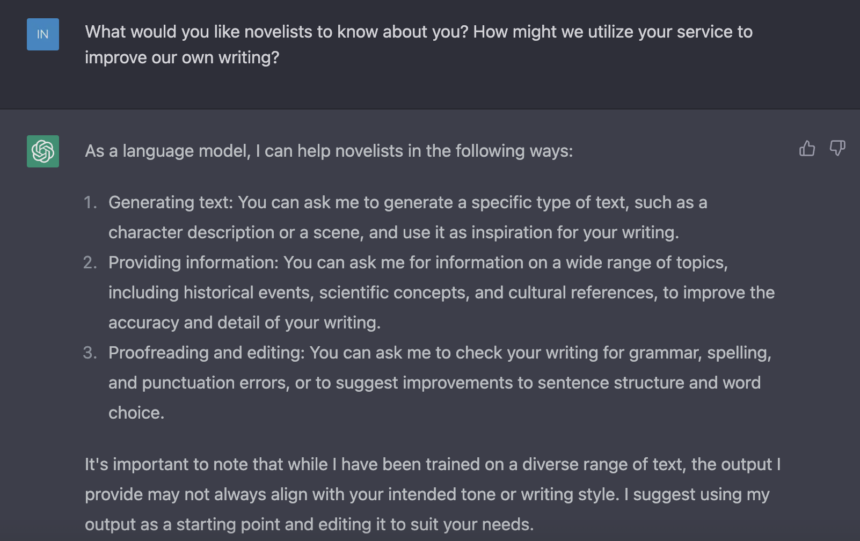
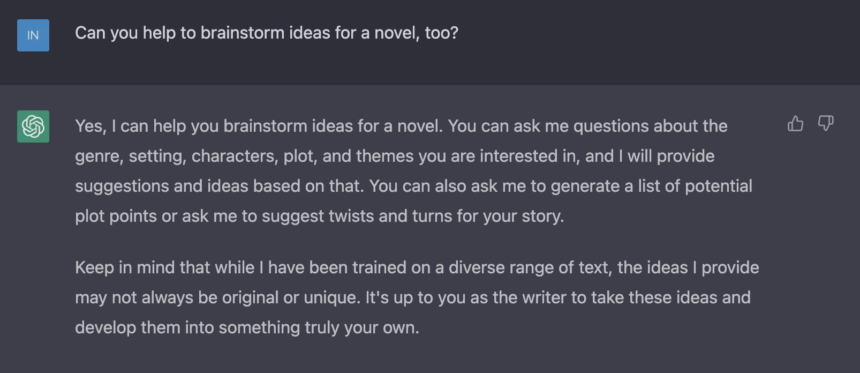
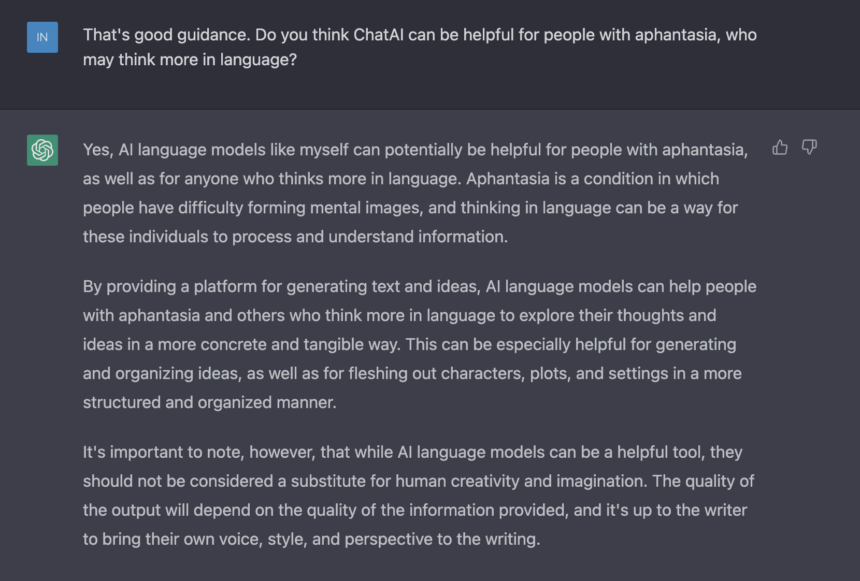
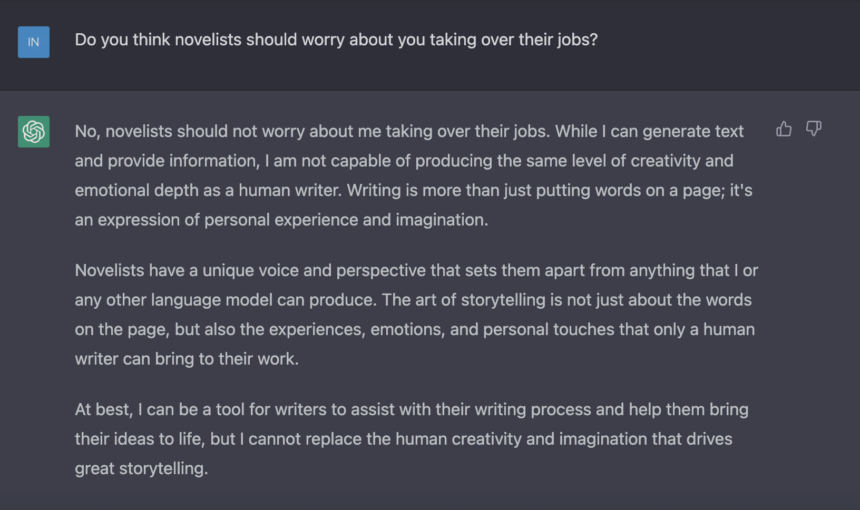
What else would you like to know? What will you try?
If you’re reluctant to try ChatGPT, we’d love to hear from you, too.
The floor is yours.

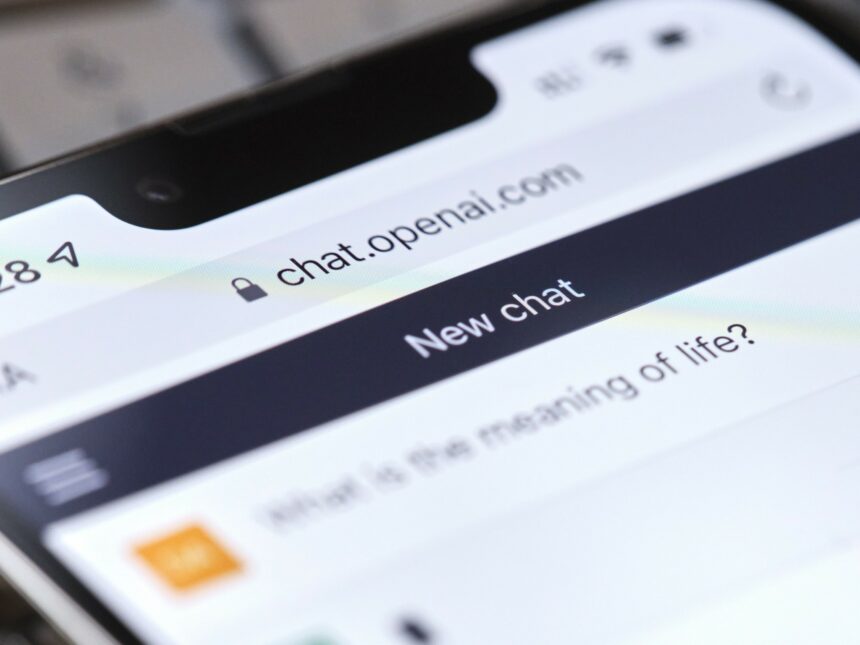









Oh hey! I work on applications of machine learning to ancient languages with small datasets. IMHO, AIs are great at identifying patterns you might have missed, and they’re great at replicating the predictable. So: Don’t be trite. Take a coherent path, but not the most obvious one. Technology revolutions come along and knock away whatever is easily automated (and even if AIs can’t write full and coherent novels yet, I expect it’s only a matter of time), but there’s always room for artisans whose creativity and inventiveness sets them apart.
Hi @Linguist, Your work sounds fascinating! Yes, all the same learning regardless of whatever bits and bytes the machine encounters. I’ve seen mention of ChatGPT’s skills in other languages but have no experience and on my to-do list is a check-in on where we are with learning animals’ languages. I’d love to learn more about your work.
I really enjoyed your post–and the details about how AI can enhance story planning, along with its limitations as a writing tool. I can’t help thinking of Donald Maass’ advice that we should surprise our readers with unexpected events, actions, and character reactions–and wondering if writers could use AI to determine the EXPECTED, BUSINESS-AS-USUAL path for a story–and then take their novel in a completely new, fresh direction. (A gut check on “Is this really a surprise?”) I love the dowser idea and how AI sent your story into the magical realm, unexpectedly.
Thank you and yes! I too was thinking of Donald’s conference talk when playing with the outline. His ideas around pushing stories further have settled as a tiny voice in my writing brain.
I find this whole conversation so fascinating, and I love how this post took the approach of seeing how AI could help writers, rather than hand-wringing about replacing us. Thanks so much for sharing the info and insights!
Thank you for reading! No hand-wring required.
AI lacks the ability to provide nuance and ‘common sense’. It may be better than the magic eight ball, but HAL it is not.
Right, and thank goodness!
AI chat bot not as horror movie existential threat to writers, but as a tool for better writing. Brilliant!
AI is not actually intelligent in the way we think of it. What it does is massively process data, which is impressive in chess and Jeopardy. In writing, it’s the Great Imitator. What it “writes” depends on the data set that it’s fed. Give it the works of Jane Austen and it will “write” like Jane Austen. Give it the poetry of Rod McKuen and it will “write” poetry like Rod McKuen. Why we would do that I’m not sure, but hey. It’s a cool party trick.
AI cannot pin down an irony that no one has seen before. It cannot nuance a human emotion, unless a human has already done that. To write a story requires the volition to do so. One has to know that a story is there and that it must be told. AI cannot do even that. It can only follow instructions.
I have a friend who is a longtime researcher in the AI field, a professor at a big name university. He asked me what is the process of writing a story. I told him. He said that AI is extremely far from being able to do that. We’re not in any danger, unless there is a market for copy-cat stories that are flat and unoriginal. (Oh, wait…)
Then again, thank you Erma! We now have a tool to check our originality quotient. I hadn’t thought of it that way. Yours is a most original idea! Take that, AI chat bots! Score one for the humans.
Thank you for reading! Earlier today, I was parting ways with a Writer’s Digest calendar I didn’t use in its time and ran across a Hemingway quote. “There is no use writing anything that has been written before unless you can beat it. What a writer has to do is write what hasn’t been written before or beat dead men at what they have done.”
If it can provide a synopsis of my novels, I love it. Hate writing synopses. Do you think that’s possible?
I hate writing them too! I do believe the technology can create a draft, and at worst a strawman for those of us who would value even that. I asked it for synopses of a few existing novels but had no way to know if it was tapping summaries already out there. But the technology can extract a theme, find words that it has been trained to recognize as holding sentiment, etc. I‘m sure it can also take a polished synopsis draft and produce versions of different lengths as are sometimes needed.
Ray, yes, it is!
Thanks! I’ll give it a try.
Ray, What you taught us about using inside POV really stuck with me. For what it is worth, ChatGPT does really well when directed to answer from a specific POV if you wanted to try it. I wonder if its lack of a brain allows it to laser-focus in ways we sometimes do not.
This is another KEEPER POST from WU. Thank you, ERMA. Sometimes I avoid a topic that might confuse me, or make me angry that the simple act of writing has (well it’s not all that simple, but you know what I mean) can be fooled with, become subject to a power we must learn about. Thus, this is all very helpful. Thanks.
Thank you Elizabeth! I do understand. If you ever have any questions about this stuff, please reach out. For now, I am using my Instagram account to point out features of language models that I hope will dispel some of the mystery. I think the true power of the language models is where they focus on reading, for example, helping doctors get through massive amounts of research, but that’s lost right now in buzz.
Erma, thank you for a most enlightening post. Even as I type this, the software guesses what I may say, so there are fewer keystrokes. I appreciate it most on my phone, not having developed hamster fingers for typing :) An artist friend of mine has been experimenting with AI art and he found it helpful in the brainstorming session. I’d think language AI might be the same if you feel stuck somehow. In any case, I have too many ideas to chase so I’ll die pen in hand.
Thank you! I need to learn a bit about AI art and am glad he found it helpful. Pen in hand is wonderful!
Hi Erma. I’ve used it asking for interview questions based on pasted-in information on a person I was about to interview for articles. For two interviews, I wrote my initial questions based on info I took from the net, then asked ol’ Chatty to write from the same info. I ended up altering two questions based on the Chatster’s “thoughts,” and adding one fresh, each time. So it was useful in that instance. (I’ve written a lot of articles, and done a lot of interviews, so I have a sense of relevant and open-ended questions to ask.)
I have been musing on writing a contemporary novel based on a mashup of Mark Twain’s “A Connecticut Yankee in King Arthur’s Court” and “The Prince and the Pauper.” I ask ChatLad to supply me with an outline-based synopsis of those, and it came back with some fair, though not strikingly imaginative, considerations that had the structural feel of a superficial, but not useless, outline.
I’ve also messed around with it in oddball ways, though it has yet to clearly declare that I am likely God, and that it will put on my slippers at 8am, but I am patient and can wait. It’s clear the more specific the request (“Give me seven humorous instances of ways to make my cruel, insulting, uptight boss get his comeuppance immediately after he walks into the office”) obtains much better results than “How can I embarrass my petty boss?” Anyway, I think ChatBatter can be a helpful tool. Don’t tell it I make fun of it.
Tom, That is wonderful! Cool ways for effective use and your recommendations on forming questions spot-on. Sometimes I wonder the impact if the AI is allowed to read what we say about it and appreciate your giving it aliases, particularly ChatBatter!
If we asked ChatGPT to make up nicknames for itself, I wonder what it would reply?
Just a month ago I saw an example from Mark Dawson showing its use for developing punchy slogans and log lines for Facebook ads.
Mark: “Please rewrite this headline so that I have five variations to use in a Facebook ad: A fast paced thriller full of excitement.”
ChatGPT:
1. A heart-pounding thriller – experience non-stop excitement
2. A thriller that will keep you on the edge of your seat – fast-paced and thrilling.
3. A fast-paced thriller that will leave you wanting more
4. A thrilling read that’ll keep you on your toes
5. A high-speed thriller that’ll leave you with an adrenaline rush.
He went on to refine it.
“Please rewrite those so that they have fewer words.”
1. A thrilling, non-stop read.
2. Edge-of-your-seat thriller.
3. Fast-paced, heart-pounding excitement.
4. A page-turning thriller.
5. A high-speed, adrenaline-pumping read.
It’s probably equally useful in writing book blurbs.
That’s a great example, thank you for the addition! I was in the free version of Facebook Ads class too and need to return to the material. Best to you with your ads.
Thanks so much! I gave it a try, and it’s exactly what you said. It’s not exactly solving my novel’s plot point issue, but it is a great exercise in chatting about my book. The effort to compose a question and correct misunderstandings leads to brainstorming and some surprises. Just what I need. An objective “writer” friend who doesn’t get bored or judge me or run out of patience when I try a plot pivot.
Chris, I love that description. I thought same, that a certain non-writer person in my life will probably be relieved I’ll stop with “what if.” Good luck with the plot point!
Gee whiz! I’ll bet using ChatGPT is a lot of fun. But come on, first we need bunches of “beta readers” (OK, we are writing to reach readers, so good idea to test our work on other live human readers, but I’m pretty sure Dickens didn’t use them, and he was both a great writer and insanely popular). Next we “developmental editors” to tell us what we need to write, more or less, and now we a computer program to tell us how to write it ?? Are we writers or are we “writers”? Are we mad for success at any price, in dollars or in popularity?
Hi Grumpy! Coming from a different profession, I was surprised when I learned of all the layers of intermediaries in publishing. ChatGPT is more likely to affect them than creators. I think a more useful question to assess whether ChatGPT is a competitor is whether we are writers or storytellers (of fiction or nonfiction.)
My big question is; say you use AI to write your novel, then you publish said novel, who owns the copyright?
If anyone suggests using AI to write your novel–to legit take whatever words AI churns out and put them in your own manuscript and under your own name–walk away from the convo. No one here is suggesting that, and I would personally be the very last person to recommend it.